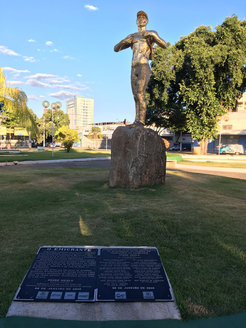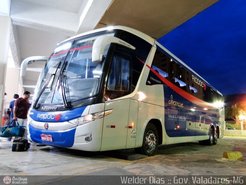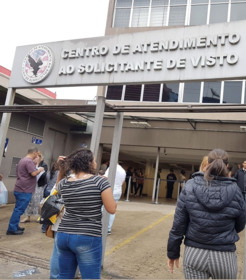Blog | December 2019
‘Boa viagem’ (or ‘visa trips’): on migration, separation, and faith
Accounts from my fieldwork with transnational Brazilian families
by Dora Sampaio
More or less once a month, an ônibus (coach) departs from Governador Valadares, a small city in the interior state of Minas Gerais, headed to the General Consulate of the United States in Rio de Janeiro. In one of those trips, on a chilly winter evening, is Nilton, a 70-year-old from Valadares, his wife and another 40 or so people. As they head to the ‘marvellous city’ (‘cidade maravilhosa’, as Rio is also known), they all wish to hear ‘boa viagem’ [Have a good trip] by the end of their appointment, signalling their successful visa application to travel to the United States.
In Governador Valadares, the Brazilian city where I conducted my field research in the early months of 2019, emigration, mainly to the United States, has become a central part of the local culture (Martes, 2011; Siqueira, 2018). The outpouring of migration from Valadares and its microregion has granted the city several nicknames, including ‘Valadolares’ (given the high influx of dollars to the city), and ‘national capital of emigration’ (Machado and Reis, 2007: 153). In Valadares, a city of 278,685 inhabitants (2018), the marks of emigration and remittances received from abroad are inscribed in its everyday landscape. They are particularly visible in the houses built with money wired from abroad, as well as in the branded clothing, watches, bags and mobiles phones received from relatives in the United States. While initially the journeys I detail here were not central to my research that focusses mainly on transnational care, they soon became significant, as older parents narrated them as a vital element to the stories I was being told. Indeed, the ‘visa trips’ depicted here decisively shape the lives of transnational Brazilian families, by enabling and limiting access to transnational mobility, especially in contexts of undocumented migrants abroad.

But let me get back to Nilton’s trip to Rio de Janeiro. Like many before him in Valadares, Wilson, Nilton’s son, also left for the United States. It had been almost 18 years since Nilton and his wife had seen their son. They had to put their house on the line to finance Wilson’s crossing of the Mexico-United States border and had gotten accustomed over the years to the idea that the closest they could get to their son was through their mobile phone’s camera. And then, in February of 2018, things changed: Nilton’s daughter (now approaching her 40s, with a stable job in Valadares) got her visa to the United States, and she was adamant about ‘not travelling alone’.

Coach departing from Governador Valadares (Photo: https://onibusbrasil.com)
It was a Wednesday evening, at 6 pm, and the bus was full, as Nilton relays. Every passenger was hopeful about getting a visa to travel to the United States. Often, as is the case for Nilton and his wife, it is up to older parents and siblings to visit immobile family members living undocumented abroad. It was a long and strenuous trip of more than 10 hours; just before dawn, the coach finally approached Rio’s skyline. ‘Os rapazes’ [‘the guys’, the experienced trip organisers] are well acquainted with the visa application process. They skilfully prepare the applicants for what lies ahead – what documents to show, and not to show, what to say, and what not to say. And beyond all that looms an indispensable factor, luck. Of the 48 who travelled to Rio this time, 28 were lucky. Nilton and his wife were among the lucky ones. ‘Deu certo, graças a Deus’ [Thank God, it worked out]. As Nilton recollects:
And so, we entered the room. The lady looked at us and asked ‘so you’re planning on travelling to the United States?’ and I replied ‘yes, we’re wanting to, it’s just a matter of you letting us’ [he laughs]. ‘Let’s see… so how many children do you have?’ ‘A couple…’ ‘And do both live with you?’ ‘No, one lives with us, the other doesn’t’. And then I started nervously wondering ‘what if she asks me where the other one lives, and what do I say?’ But luckily, she didn’t ask about it. … ‘Boa viagem’ [Have a good trip], she said instead.
While the number of visa-seekers from Valadares has been decreasing over the years, it has not ceased. In fact, the ‘visa trips’ to Rio de Janeiro or São Paulo gathers enough travellers every month or so. According to the local authorities, in 2014 alone at least 1,250 passports were issued per month in the city of Valadares and, despite bureaucratic hurdles, it is still the city with the highest number of passports issued in the state of Minas Gerais, second only to Belo Horizonte, the state’s capital (Gonçalves, 2014).

Visa to the United States (Photo: iStock)
For Valentina and her husband, it took three visits to the U.S. Consulate in Rio de Janeiro to be able to visit their children abroad. With their three sons living in the United States – the middle one for almost 20 years, the eldest one for 15 years, and the caçula [youngest] for five years – and only the latter holding a legal residence permit, the couple’s journey to a U.S. tourist visa was a trying one. Looking apprehensive, Valentina recounted her experience: ‘I found it emotionally exhausting, such a tense place, it makes you anxious. I lost a good 10 kilos during that time… everyone going there and getting their visa applications denied.’ It was the end of September 2016, when Valentina and her husband finally travelled to Rio, after getting some help with the required paperwork. As usual, the bus was cramped, with seats full of people – people full of hopes. Their interview was set for the next day, early in the morning. Valentina distinctively remembers the armed policemen at the front door. She remembers the stiffness of the people, the chilly air and the oppressive silence in the room.
When they ask you things, they already know the answers. Everything is on their computers. The young lady, she directed all questions to me, none to my husband. She asked me why we wanted to visit the U.S. I said we wanted to visit our children, that it was our 50th anniversary and we would like to celebrate it with them. She asked me if they were legal… I shook my head, ‘only one’… and then I thought, ‘I’m done here’. She asked me ‘do you want to live there permanently?’, I said ‘no, absolutely not. My husband is retired, we have our things here, and he is already 80. We have our health plan here; we only want to visit’. She said nothing else. She handed the paper and wished us ‘boa viagem’.
Valentina couldn’t hold back the tears once she heard the words: ‘I cried as a madwoman, the people around us must have thought I was crazy, crying and thanking God.’ She left the building and held on to the metal bars that surrounded it, still crying. A passerby stopped and asked whether she was crying of sadness or happiness, she shouted: ‘Of happiness, lots of happiness. It’s the third time we came here, and I finally get to see my sons.’ Her son wanted to book the plane tickets straight away, but the passport would take at least 15 days to arrive. In October, the couple reunited with their children, in a surprise arrival planned by their youngest son abroad, taking his other two siblings by surprise.

Applicant Service Center for U.S. visa
(Photo: Centro de Atendimento ao Solicitante de Visto)
The first time Fernanda applied for a U.S. visa was in Rio de Janeiro, and it was denied. For a decade, she did not try again. Her youngest daughter left for Boston in 2003, soon after she turned 18. She dreamed of a better life abroad, and at the time there were many offers in the city from coyotes[i] promising to take people thorough the Mexico-United States border. Fernanda’s daughter who stayed in Brazil, on the other hand, studied her way up to a teaching position at a University, and now lives in São Paulo. She had little hopes that her mother would get a visa to visit her sister in the U.S.: ‘Mom, it is really difficult these days. Someone at my university, who is going to live there and work at a university there, had a really hard time to get his visa approved… and for you, with a low income and all…’ Everyone doubted that Fernanda would be able to get a visa, but she was determined and had faith in God ‘I’m not going there to apply for a visa, I’m going there to get my visa’, she recollects. When she finally got it, she cried – ‘it was just tears rolling down my face, I couldn’t speak. God blessed me, and I made it’.
Nilton, Valentina, Fernanda and their families give voice to the many more that every month or so, try to re-connect with their families abroad. In their articulations of transnational (im)mobilities across borders they draw attention to mobility as a right, and too often as a privilege. They are exemplary of resilience, perseverance and belief.
Agradecimentos: Muito obrigada a todos aqueles que partilharam e continuam partilhando as suas histórias de migração e ligações transnacionais. Obrigada à Prof. Sueli Siqueira, Rafael Barbosa Lucas, Sandra Nicoli (UniVale) e Prof. Ana Cristina Martes (Fundação Getúlio Vargas, FGV) pelo apoio a esta pesquisa.
References:
Gonçalves, A. L. (2014) ‘Sonho americano ainda vive entre os Valadarenses’. In Hoje em Dia. Retrieved from:
https://www.hojeemdia.com.br/horizontes/sonho-americano-ainda-vive-entre-os-valadarenses-1.249432 [Last accessed 31.10.2019]
Machado, I. and Reis, E. (2007) Algumas conclusões acerca do fluxo de Valadarenses para Portugal. Teoria & Pesquisa, XVI, 1, pp. 153-166.
Martes, A.C.B. (2011) New Immigrants, New Land: A Study of Brazilians in Massachusetts. Gainesville, University Press of Florida.
Siqueira, S. (2018) Introdução – Ligações migratórias contemporâneas: Brasil, Estados Unidos e Portugal. In Siqueira, S. (Org.), Ligações migratórias contemporâneas: Brasil, Estados Unidos e Portugal. Governador Valadares, MG: Editora Univale, pp. 9-20.
[i] Coyote is a colloquial Mexican–Spanish term referring to the people involved in people smuggling across the Mexico-U.S. border.











